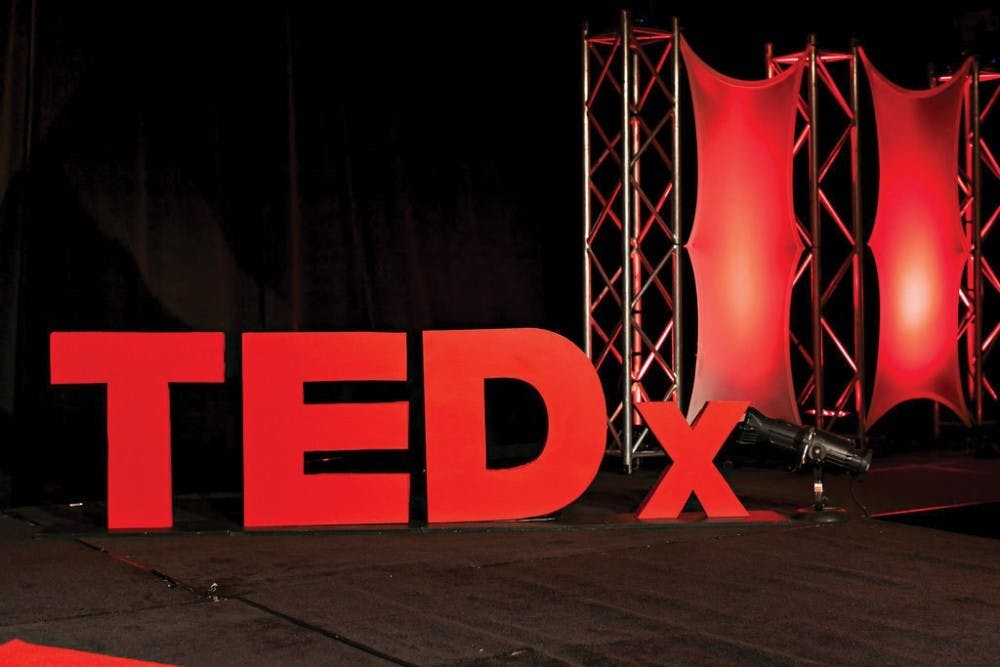TEDxPenn hosted its first-ever online conference, featuring eight speakers, question and answer sessions, and new online activities.
The theme for the April 10 conference was “Unknown,” centering around stories of science, discovery, and the human condition. The speeches at the event were pre-recorded and live-streamed on Zoom and Facebook Live, while the speaker introductions and chat sessions with speakers happened in real-time. TEDxPenn also hosted several online activities such as haircut simulations inspired by self-taught barber P. Michael Boone’s talk, and a “build your own emoji” activity inspired by Angela Guzman, who played a part in designing the original Apple emojis.
Other speakers included Perelman School of Medicine professor César de la Fuente, Weitzman School of Design professor Sonja Dümpelmann, NFL player and Penn professor Brandon Copeland, health policy fellow Paul Shattuck, and impact-focused media influencer Alanis Broussard. Professor of Communication, Psychology and Marketing Emily Falk also honored former director of Penn's Peace and Conflict Neuroscience Lab Emile Bruneau, who died in 2020, by presenting his work.
In the second speech of the event, Dümpelmann discussed the environmental importance and complexities of tree-planting in urban areas.
Dümpelmann described the time she saw a chocolate bar with packaging promising that one tree would be planted for every five bars sold. She said this is an example of "greenwashing," or creating a false perception of a company’s environmental friendliness, because there was no indication of where and when the tree would be planted.
The anecdote was a precursor to her broader discussion about the benefits of planting trees in urban areas, such as human well-being, beauty, and reducing urban heat.
Dümpelmann said in an interview with The Daily Pennsylvanian that one goal of her talk was to emphasize the importance of co-inhabiting earth with the living and nonliving aspects of nature.
“We need to take care of the individual trees, but the individual tree in a way stands for nature as a whole," Dümpelmann said in an interview. "I believe that if we have empathy, compassion for each other, then there’s a greater possibility we will also have empathy and compassion for non-human nature.”
RELATED:
Penn juniors co-host conference with female hospitality industry leaders and restaurateurs
At TED Talk-inspired event, grad students present research at annual 'Grad Ben Talks'
After Dümpelmann's talk, P. Michael Boone, the fourth speaker at the event, described his struggles as a young student and how he developed a passion for cutting hair and teaching others.
Boone said that by his senior year of high school, he had been kicked out of 12 schools.
"I used to think that my teachers hated me,” he said in the talk.
But in his senior year, he met a teacher who listened to his struggles and passion for cutting hair.
“In his class, I didn’t feel like that was school. I always felt like, man, I’m just kicking it with this cool guy," he said in an interview. "We could talk to him like the way we talk, our vernacular.”
The teacher offered him a deal: behave well for the first four days of the week, and on Friday, he could cut his classmates’ hair.
Boone said that he later decided to become a barber and attend barber school, and while he failed part of the barber exam at first, he studied hard for his second try and eventually passed.
As a volunteer at local public schools and a teacher at his own barber school, Philadelphia's Junior Barber Academy, Boone wants to emulate the empathy his teacher showed him in senior year.
Laney Broussard, a first-year student at Boston University, was the final speaker at the event. She emphasized the false sense of perfection that people portray of themselves on social media, and how individuals should embrace their imperfections instead.
Broussard said her goal as an influencer, or in her words, a media maven, is to give people tools to find themselves and tell their own stories. She added that her goal stems from her own imperfections, such as past struggles with a stutter and social anxiety.
She argued that influencer culture had led young people to hide themselves and their imperfections, even though what they see on social media is a perfected version of reality.
“In an attempt to become the highest trending, most relevant, most widely known, we have started to place our originality and relatability in looking, sounding, and acting like everyone else,” she said in her talk.









